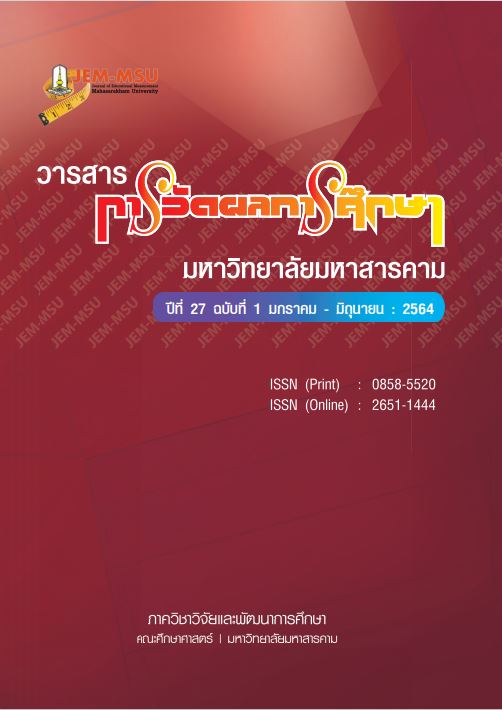Contemplative Education and Adaptation of Learners in Disruptive Innovation Era
Main Article Content
Abstract
Contemplative education is a learning process undertaken thoughtfully by the mind. It truly emphasizes development of the mindset, the mind, and the internal emotion for self-awakening and awareness, for knowing the value of things without any bias, leading to love, kindness, and public mind, and it can be applied and linked to various sciences used in daily life with balance and preciousness. With this reason, contemplative education is considered as both a concept and a practical guideline aiming to generate learning for changes in various levels, which are internal changes, organizational changes, and social changes.
In organizing for learning in the disruptive innovation era, the important factor is a global growth mindset, or a conceptual process for universal growth. To be successful in organizing for learning, learning process is more important than learning achievement. In organizing for learning, the teacher is required to build motivation on the use of new innovations and technology to stimulate students to have enthusiasm to learn through learning by doing. The learning process of contemplative education focuses on practices leading to internal changes that results in self-confidence and self-esteem stimulation. Consequently, the students will have life immunity to live their lives with balance under the current rapid changes. It will lead to having citizens with readiness for making the country advanced on internal wisdom and external wisdom that keep up with changes which consequently they will become thought leaders, practical leaders, and innovative leaders in the future.
Article Details
The content and information contained in the published article in the Journal of Educational Measurement Mahasarakham University represent the opinions and responsibilities of the authors directly. The editorial board of the journal is not necessarily in agreement with or responsible for any of the content.
The articles, data, content, images, etc. that have been published in the Journal of Educational Measurement Mahasarakham University are copyrighted by the journal. If any individual or organization wishes to reproduce or perform any actions involving the entirety or any part of the content, they must obtain written permission from the Journal of Educational Measurement Mahasarakham University.
References
โครงการเอกสารวิชาการการเรียนรู้สู่การเปลี่ยนแปลง ศูนย์จิตตปัญญาศึกษา มหาวิทยาลัยมหิดล. (2552). จิตตปัญญาศึกษา คืออะไร. (พิมพ์ครั้งที่ 1). นครปฐม:ศูนย์จิตตปัญญาศึกษา มหาวิทยาลัยมหิดล.
จุมพล พูลภัทรชีวิน. (2551). จิตตปัญญาศึกษารุ่งอรุณแห่งจิตสำนึกใหม่ทางการศึกษา.ในจิตตปัญญาศึกษา: การศึกษาเพื่อการพัฒนามนุษย์: รวมบทความการประชุมวิชาการประจำปี 2551. (หน้า 354-380). กรุงเทพฯ: โครงการศูนย์จิตตปัญญาศึกษามหาวิทยาลัยมหิดล.
จิรัฐกาล พงศ์ภคเธียร. (2551).“จิตตปัญญาศึกษาในประเทศไทย (Contemplative Education in Thailand)” จิตตปัญญาศึกษา : การศึกษาเพื่อพัฒนามนุษย์. นครปฐม มหาวิทยาลัยมหิดล.
ชลลดา ทองทวี และคณะ. (2551). รายงานผลการดำเนินงานฉบับสมบูรณ์ โครงการวิจัยและจัดการความรู้จิตตปัญญาศึกษา. กรุงเทพฯ: สำนักงานกองทุนส่งเสริมสุขภาพ และศูนย์จิตตปัญญาศึกษา มหาวิทยาลัยมหิดล.
ณัฐฬส วังวิญญู. (2552). สรุปความรู้จากการอบรม “ภาวะผู้นำทางจิตตปัญญาศึกษาสู่มหาวิทยาลัย”. หลักสูตรที่ 1 : การเรียนรู้ด้วยหัวใจที่ใคร่ครวญ (Contemplative Education), กรุงเทพฯ : สกศ.
ธนา นิลชัยโกวิทย์ และอดิศร จันทรสุข. (2551). ศิลปะการจัดกระบวนการเรียนรู้เพื่อการ เปลี่ยนแปลง : คู่มือกระบวนการจิตตปัญญา. พิมพ์ครั้งที่ 1. ศูนย์จิตตปัญญาศึกษา มหาวิทยาลัยมหิดล.
ประเวศ วะสี. (2550). มหาวิทยาลัยไทยกับจิตตปัญญาศึกษาและไตรยางค์แห่งการศึกษา. กรุงเทพ ฯ : ศูนย์จิตตปัญญาศึกษา มหาวิทยาลัยมหิดลและแผนงานพัฒนาจิตเพื่อสุขภาพ สนับสนุนโดยสำนักงานกองทุนสนับสนุนการสร้างเสริมสุขภาพ.
ประเวศ วะสี. (2554). ระบบการศึกษาที่แก้ความทุกข์ยากของคนทั้งแผ่นดิน. (พิมพ์ครั้งที่ 2). นครปฐม:ศูนย์จิตตปัญญาศึกษา มหาวิทยาลัยมหิดล.
พิพัฒน์ เหลืองนฤมิตชัย. (22 กรกฎาคม 2559). Disruptive Technology กับการลงทุน. [ออนไลน์]. ได้จาก https://thaipublica.org/2016/07/pipat-48/ [สืบค้นเมื่อ 2 มิถุนายน 2563].
วิชัย วงษ์ใหญ่ และมารุต พัฒผล. (2562). การจัดการเรียนรู้ในยุค Disruptive Innovation. กรุงเทพ ฯ : ศูนย์นำนวัตกรรมหลักสูตรและการเรียนรู้.
สรยุทธ รัตนพจนารถ และคณะ. (2552). ริเริ่มสำรวจความรู้น้อมเข้ามาสู่ใจใคร่ครวญประยุกต์ใช้ปฏิบัติ.
การประชุมวิชาการประจำปี 2552. โครงการศูนย์จิตตปัญญาศึกษา มหาวิทยาลัยมหิดล.
สุมน อมรวิวัฒน์. (2549). บทบาทของสถาบันการศึกษาต่อการพัฒนาจิตใจ. กรุงเทพฯ: เจริญผล.
Dougherty, D. (2006). Organising for innovation for 21th century. In S.R. Clegg, C. Hardy, T.B. Lawrence, and W.R. Nord (Eds.), The Sage handbook of organization studies. (pp.598-617). London: Sage.
Mierzejewska, B. (2011). Media management in theory and practice. In M. Deuze. Managing media work. London: Sage.
Perez-Latre, F. J. and Sanchez-Tabernero, A. (2003). Leadership, an essential requirement for effecting change in media companies: An analysis of the Spanish market. International Journal of Media Management, 5(3), 198-208.
Rudolf Steiner. (2006). A Modern Art of Education. London: Rudolf Steiner.


